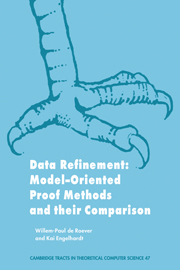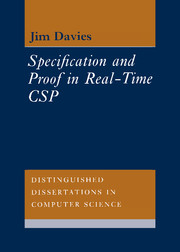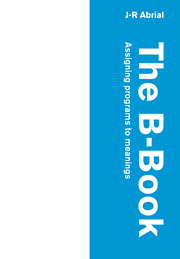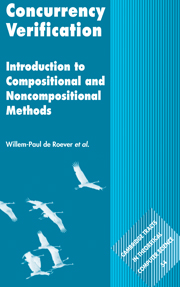Data Refinement
Model-Oriented Proof Methods and their Comparison
$66.99 (C)
Part of Cambridge Tracts in Theoretical Computer Science
- Authors:
- Willem-Paul de Roever, Christian-Albrechts Universität zu Kiel, Germany
- Kai Engelhardt, University of Technology, Sydney
- Date Published: December 2008
- availability: Available
- format: Paperback
- isbn: 9780521103503
$
66.99
(C)
Paperback
Other available formats:
Hardback, eBook
Looking for an examination copy?
If you are interested in the title for your course we can consider offering an examination copy. To register your interest please contact [email protected] providing details of the course you are teaching.
-
The goal of this book is to provide a comprehensive and systematic introduction to the important and highly applicable method of data refinement and the simulation methods used for proving its correctness. The authors concentrate in the first part on the general principles needed to prove data refinement correct. They begin with an explanation of the fundamental notions, showing that data refinement proofs reduce to proving simulation. The topics of Hoare Logic and the Refinement Calculus are introduced and a general theory of simulations is developed and related to them. Accessibility and comprehension are emphasized in order to guide newcomers to the area. The book's second part contains a detailed survey of important methods in this field, such as VDM, and the methods due to Abadi & Lamport, Hehner, Lynch and Reynolds, Back's refinement calculus and Z. All these methods are carefully analysed, and shown to be either imcomplete, with counterexamples to their application, or to be always applicable whenever data refinement holds. This is shown by proving, for the first time, that all these methods can be described and analyzed in terms of two simple notions: forward and backward simulation. The book is self-contained, going from advanced undergraduate level and taking the reader to the state of the art in methods for proving simulation.
Read more- Broad-based and comparative treatment of methods
- Exercises provided for students
- Historical illustrations
Reviews & endorsements
"The presentation of the theory is backed up by some substantial examples...and this together with the extensive historical notes makes the book an extremely useful reference manual and graduate text."
Customer reviews
Not yet reviewed
Be the first to review
Review was not posted due to profanity
×Product details
- Date Published: December 2008
- format: Paperback
- isbn: 9780521103503
- length: 436 pages
- dimensions: 229 x 152 x 25 mm
- weight: 0.64kg
- contains: 18 b/w illus. 93 exercises
- availability: Available
Table of Contents
Part I. Theory:
1. Introduction to data refinement
2. Simulation as a proof method for data refinement
3. Relations and recursion
4. Properties of simulation
5. Notation and semantics
6. A Hoare logic
7. Simulation and Hoare logic
8. An extension to total correctness
9. Simulation and total correctness
10. Refinement calculus
Part II. Applications:
11. Reynolds' method
12. VDM
13. Z, Hehner's method and Back's refinement calculus
14. Refinement methods due to Abadi & Lamport and Lynch. Appendix A. An introduction to Hoare logic
Appendix B. A primer on ordinals and transfinite induction
Appendix C. Notational convention
Appendix D. Precedences
Bibliography
Index.-
General Resources
Find resources associated with this title
Type Name Unlocked * Format Size Showing of
This title is supported by one or more locked resources. Access to locked resources is granted exclusively by Cambridge University Press to instructors whose faculty status has been verified. To gain access to locked resources, instructors should sign in to or register for a Cambridge user account.
Please use locked resources responsibly and exercise your professional discretion when choosing how you share these materials with your students. Other instructors may wish to use locked resources for assessment purposes and their usefulness is undermined when the source files (for example, solution manuals or test banks) are shared online or via social networks.
Supplementary resources are subject to copyright. Instructors are permitted to view, print or download these resources for use in their teaching, but may not change them or use them for commercial gain.
If you are having problems accessing these resources please contact [email protected].
Sorry, this resource is locked
Please register or sign in to request access. If you are having problems accessing these resources please email [email protected]
Register Sign in» Proceed
You are now leaving the Cambridge University Press website. Your eBook purchase and download will be completed by our partner www.ebooks.com. Please see the permission section of the www.ebooks.com catalogue page for details of the print & copy limits on our eBooks.
Continue ×Are you sure you want to delete your account?
This cannot be undone.
Thank you for your feedback which will help us improve our service.
If you requested a response, we will make sure to get back to you shortly.
×





